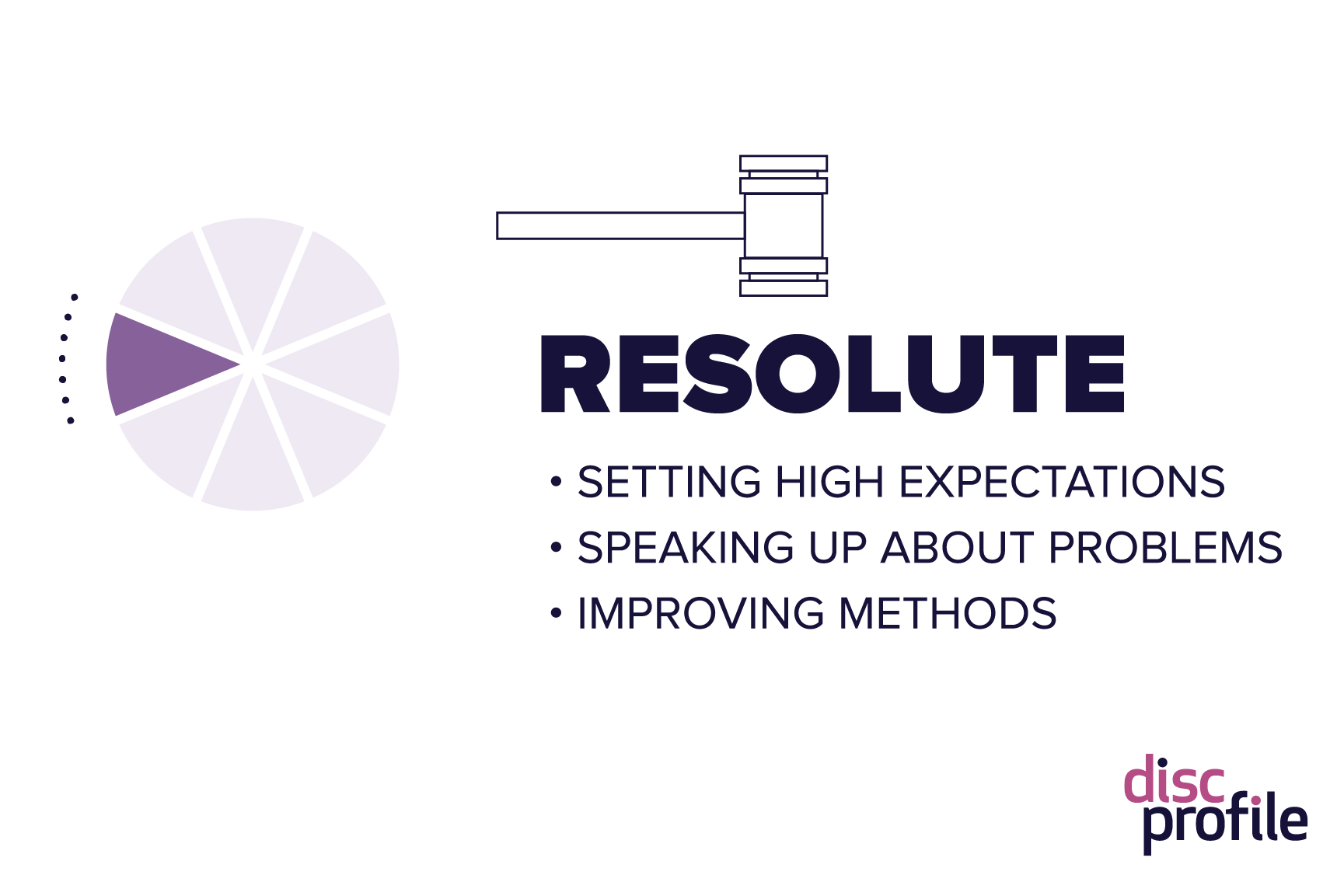Resolute Leaders: DiSC CD or DC style leadership
Key Takeaways
- Resolute leaders align with the DC or CD style in the Everything DiSC® model of leadership.
- People with a resolute leadership style are challenging, rational, and tough-minded.
- Every type of leader can learn from resolute leaders how to focus on results, face problems head-on, and be okay with upsetting people from time to time.
Resolute leadership is one of the eight types of DiSC leadership. Good leaders understand their natural leadership strengths and weaknesses. Great leaders understand other leadership styles and can stretch into them as needed.
The resolute leadership style
Resolute leaders are highly determined and persistent. They have the inner strength to give people courage during hard times. They tend to be natural skeptics and show disdain for weakness and incompetence. You might hear them say “should” a lot; they like to see things done the “right” way—or maybe just their way.
People with resolute leadership styles see themselves as highly competent, determined, rational, independent, and up for a challenge. If you're a CD- or DC-style leader, you likely set high standards for yourself and others. You spot inefficiencies and aren’t afraid to speak up when you see a problem.
Resolute leaders are often seen as having a fighting spirit—they will push for what they see is right. People of all personality types might want to call upon resolute qualities when a project fails or requires disciplined focus.
Leaders occupying the resolute dimension probably shy away from giving motivational, emotional speeches or showing much enthusiasm. You’re more likely to see them deep in debate or working on a tricky problem.

Deborah Ancona, professor of leadership, MIT Sloan
Strengths of the resolute leader:
- They tend to be good problem solvers.
- They’re often able to push their way through obstacles.
- They’re able to hold people accountable.
- They’re often able to identify potential weaknesses in plans.
- They’re not afraid to speak their minds.
- They’re usually able to separate feelings from issues.
- They have a competitive streak that helps them achieve their goals.
- They have high standards for themselves and others.
Goals of the resolute leader:
- Independence
- Personal accomplishment
- Efficient results
Areas for improvement:
- Warmth
- Tactful communication
- Paying attention to others’ needs
Source: The 8 Dimensions of Leadership
Deborah Ancona and Hal Gregersen of the MIT Leadership Center
What can we learn from resolute leaders?
1. Leaders need to have a fervent focus on outcomes
Resolute leaders hold people accountable, setting high expectations for quality, efficiency, and the bottom line. Many new leaders struggle with holding others accountable because they are more relationship-oriented. They aren’t comfortable asking people to make sacrifices. Or, they struggle with speaking authoritatively.
Resolute leaders start with the end in mind and look ahead toward second- and third-order consequences of decisions. They look for what might derail their forward movement. They are clear about what outcomes they want to see their people produce.
It’s important for these leaders to set challenging yet reasonable goals and to track progress. If individuals or teams aren’t on track, the resolute leader is ready to analyze why. They will hold people accountable or work to remove obstacles.
Jim Collins, business management researcher and author
2. Tough problems that plague your team are your responsibility
Not only will resolute leaders face issues head-on, they will seek them out. Other leadership styles might put up their blinders, ignoring problems that are messy or complicated.
Resolute leaders are proactive. They identify and address weaknesses in the organization or its processes.
Many leadership types are queasy about conflict. They end up expending energy and wasting time trying to avoid uncomfortable situations. The resolute leadership style reminds us that conflict is part of a healthy workplace. Additionally, you'll often save time and pain by addressing issues as soon as they arise.
Jim Kouzes and Barry Posner in The Leadership Challenge
3. The right decisions will upset people from time to time
You can’t always make decisions based on what someone else wants or on what will make others like you. Resolute leaders are tough-minded and able to make decisions objectively. This can take a level of courage and resolve.
DC- and CD-style leaders value their people and still address entrenched or politically charged problems. In fact, they tend to be good about anticipating reactions from all their constituents before they announce their decisions.
All leaders can learn to take a proactive stance when announcing their decisions. They shouldn't just let information leak out, which will confuse or worry their followers.
They can learn to connect the dots for people, tying their decisions to the organization’s goals and mission. They can learn to acknowledge objections while helping people move toward a goal. Being more resolute can help leaders look for long-term solutions rather than quick fixes.
Ron Carucci, cofounder and managing partner at Navalent
Growth opportunities for resolute leaders
Showing warmth
Resolute leaders can come across as disinterested or guarded because they are so serious and skeptical. Their insistence on high standards rather than on relationships may make them seem aggressive and cold. They might show disdain when confronted with poor-quality work or poorly constructed arguments.
Learning what they can't control
People with CD and DC styles have a drive for personal mastery. This can cause them to try to control things that can't be controlled. These leaders have a strong sense of what “should” be and can struggle with those who see things or work differently.
Mentorship and motivation
Resolute leaders have little patience for anyone they see as incompetent. They may not give employees the mentoring or opportunities that would allow them to shine. They expect things to go well and tend to let good work pass without comment. When things go wrong, however, their disapproval might be too evident.
Building enthusiasm
Resolute leaders can be detached from their teams. At times they distrust displays of enthusiasm or excitement. Because they ignore the emotional side of work, resolute leaders can have a hard time rallying their team.
DiSC for leadership skills development
Everything DiSC Work of Leaders® provides a blueprint for every style of leader to be more effective. The assessment reveals your DiSC leadership style and the report gives you personalized tools to grow your leadership skills.
Related reading
Focus on outcomes
- How does a leader know when to focus on process or outcomes? Learner-Centered Leadership
- Book Notes: Habit 2: Begin with the end in mind (from The 7 Habits of Highly Effective People), Tutuwa Ahwoi
- Why Leaders Need to Learn to Speak in Outcomes, Vistage UK Blog
Take responsibility
- 4 Leadership Practices To Establish Healthy Accountability With A Fatigued Workforce, Forbes
- What is Leadership Accountability and why is it so important? PepTalk
- The Importance of Accountability in Leadership and Business, Strategy People Culture
- The 7 Ways to Build Your Leadership Ability During a Business Crisis, Inc
Make the hard calls
- Making Difficult Decisions: Essential Steps for Leaders, Thoughtful Leader
- You’re a Leader Now. Not Everyone is Going to Like You. Harvard Business Review
- Tough leadership choices: Sometimes the best decision is the least-bad decision, TechRepublic
Posted 10/02/2018, Last Updated 11/22/2022







